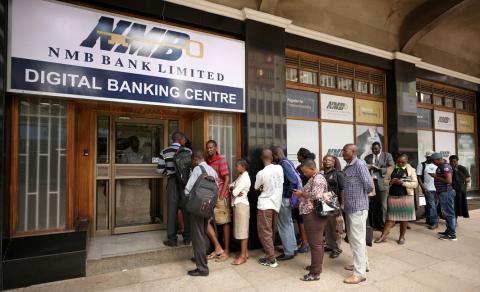Advertisement
Zimbabwe devalues currency as economic crisis deepens
HARARE (Reuters) - Zimbabwe underwent a de facto devaluation on Friday as its central bank began trading a sharply discounted replacement currency, attempting to ease a cash crunch that has hobbled the economy and plunged millions deep into poverty.
The country adopted the dollar in 2009 but, as a chronic hard currency shortage worsened, introduced a parallel system of bond notes pegged at 1:1 to the U.S. currency.
Effectively reintroducing a national currency, the Reserve Bank of Zimbabwe (RBZ) said on Wednesday it would carry out a "managed float" of the surrogate, which already fetches far less than a dollar on the black market.
On Friday, it exchanged the bond notes' replacement for dollars at a rate of 2.5.
Economists cautiously welcomed the central bank's intervention, which it hopes will temper demand for black market dollars and ease inflation as the new currency settles.
But uppermost in ordinary Zimbabweans' minds were fears it might trigger a return to the hyperinflation that plagued part of the tenure of former leader Robert Mugabe.
The success or failure of the new currency regime will go a long way towards determining whether President Emmerson Mnangagwa regains public trust, further undermined by signs that security forces are reverting to the strongarm tactics they often deployed under Mugabe.
Under the new system the bond notes - as well as the electronic dollars locked in individuals' accounts for months due to a lack of cash - will be merged into a separate currency called RTGS dollars. The name is derived from the real time gross settlement system banks use to transfer money between themselves.
The central bank sold U.S. dollars to banks at 2.5 RTGS dollars on Friday morning, Bank Governor John Mangudya told business leaders, effectively a 60 percent devaluation.
"ROUND IN CIRCLES"
Commercial banks reopened on Friday after a bank holiday, but with exchange facilities from bond notes to U.S. dollars at the same 2.5 rate limited to individual and corporate holders of foreign currency accounts, queues outside appeared to be no longer than usual.
Other members of the public should, in theory, be able to go to banks on Monday and buy U.S. dollars with bond notes or electronic dollars.
But it is not clear how many U.S. dollars the central bank, which only has enough foreign exchange for two weeks of imports, has sold to banks.
"They have done the right thing but the question is, will they have the discipline to make it work?" said Ashok Chakravati, economist and university lecturer.
Belindah Mandizha, a 25-year-old industrial designer, said she saw no material changes in the business environment, "except that the dollar rate on the black market will go up, and then the prices, then wages, until we find ourselves in the hyperinflation situation again."
Inflation hit a 10-year high of 57 percent in January.
The bond notes and notional electronic funds have plummeted on Zimbabwe's black market in recent months to around 4 per dollar.
Many foreign traders have stopped accepting bond notes as legal tender, leaving businesses such as millers, brewers and miners hamstrung - and there are concerns that the RTGS dollar will be equally unloved.
"For the umpteenth time we have yet another new currency, but this time the madness has just gone a bit too far," said Collin Chiwanza, a marketing manager.
"We are moving round and round in circles and it’s difficult to imagine if the current despotic regime will ever come up with long-term practical solutions that really work."
(Reporting by Alfonce Mbizwo; Writing by Joe Brock; editing by John Stonestreet)



















Add new comment